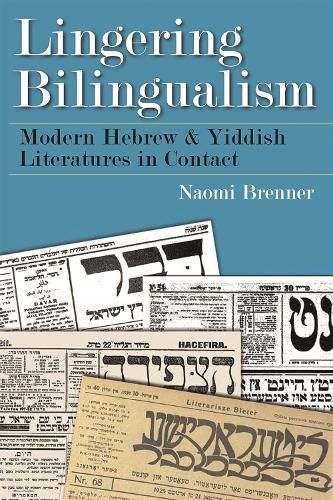Readings Newsletter
Become a Readings Member to make your shopping experience even easier.
Sign in or sign up for free!
You’re not far away from qualifying for FREE standard shipping within Australia
You’ve qualified for FREE standard shipping within Australia
The cart is loading…






At the beginning of the twentieth century, ambitious young writers flocked from Jewish towns and villages to cultural centers like Warsaw, Odessa, and Vilna to seek their fortunes. These writers, typically proficient in both Hebrew and Yiddish, gathered in literary salons and cafes to read, declaim, discuss, and ponder the present and future of Jewish culture. However, in the years before and after World War I, writers and readers increasingly immigrated to Western Europe, the Americas, and Palestine, transforming the multilingualism that had defined Jewish literary culture in Eastern Europe. By 1950, Hebrew was ensconced as the language and literature of the young state of Israel, and Yiddish was scattered throughout postwar Jewish communities in Europe and North and South America.
Lingering Bilingualism examines these early twentieth-century transformations of Jewish life and culture through the lens of modern Hebrew-Yiddish bilingualism. Exploring a series of encounters between Hebrew and Yiddish writers and texts, Brenner demonstrates how modern Hebrew and Yiddish literatures shifted from an established bilingualism to a dynamic translingualism in response to radical changes in Jewish ideology, geography, and culture. She analyzes how these literatures and their writers, translators, and critics intersected in places like Warsaw, Berlin, Tel Aviv, and New York-and imagined new paradigms for cultural production in Jewish languages. Her aim is neither to idealize the Hebrew-Yiddish bilingualism that once defined East European Jewish culture nor to recount the
language war
that challenged it. Rather, Lingering Bilingualism argues that continued Hebrew-Yiddish literary contact has been critical to the development of each literature, cultivating linguistic and literary experimentation and innovation.
$9.00 standard shipping within Australia
FREE standard shipping within Australia for orders over $100.00
Express & International shipping calculated at checkout
At the beginning of the twentieth century, ambitious young writers flocked from Jewish towns and villages to cultural centers like Warsaw, Odessa, and Vilna to seek their fortunes. These writers, typically proficient in both Hebrew and Yiddish, gathered in literary salons and cafes to read, declaim, discuss, and ponder the present and future of Jewish culture. However, in the years before and after World War I, writers and readers increasingly immigrated to Western Europe, the Americas, and Palestine, transforming the multilingualism that had defined Jewish literary culture in Eastern Europe. By 1950, Hebrew was ensconced as the language and literature of the young state of Israel, and Yiddish was scattered throughout postwar Jewish communities in Europe and North and South America.
Lingering Bilingualism examines these early twentieth-century transformations of Jewish life and culture through the lens of modern Hebrew-Yiddish bilingualism. Exploring a series of encounters between Hebrew and Yiddish writers and texts, Brenner demonstrates how modern Hebrew and Yiddish literatures shifted from an established bilingualism to a dynamic translingualism in response to radical changes in Jewish ideology, geography, and culture. She analyzes how these literatures and their writers, translators, and critics intersected in places like Warsaw, Berlin, Tel Aviv, and New York-and imagined new paradigms for cultural production in Jewish languages. Her aim is neither to idealize the Hebrew-Yiddish bilingualism that once defined East European Jewish culture nor to recount the
language war
that challenged it. Rather, Lingering Bilingualism argues that continued Hebrew-Yiddish literary contact has been critical to the development of each literature, cultivating linguistic and literary experimentation and innovation.